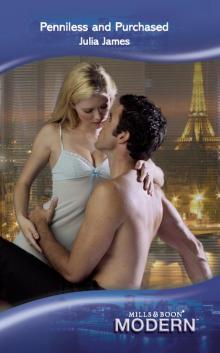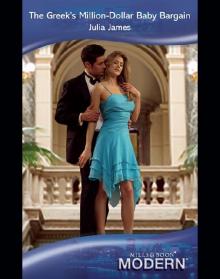- Home
- Julia James
Painted the Other Woman Page 3
Painted the Other Woman Read online
Page 3
Into her head, hard on the heels of the reprimand, came a lingering response.
What a pity.
Impatiently she sat down on the bed and tugged off her boots, exchanging them for a pair of pumps more suited to being indoors. Time to stop mooning over a tall, dark stranger she’d seen for all of ninety seconds—if that—and remind herself that she was here for Ian’s sake, not anything else. Ian was the sole focus of her life and she had better remember that. She had so little time with him as it was, and every stolen moment together was precious. Speaking of which …
She checked the voicemail on the landline phone beside her bed. To her pleasure it was indicating a new message. She pressed ‘play’ eagerly, but as she listened to the message her face fell.
‘Marisa, I’m so, so sorry! I can’t make tonight. I’m really gutted. But a pile of work’s come my way—some deal that has to be signed off by ten tomorrow morning—and that means I’m going to have to burn the midnight oil, checking through everything. If all goes smoothly maybe—maybe—I can make lunch. I’ll text you late morning—’
Ian’s voice cut out, and she stared disconsolately at the handset. She hadn’t seen Ian for three days, and she’d been so hoping that tonight would be on. She’d filled the three days as she filled all her days now—’doing’ London. But what had seemed an exciting prospect when she’d first moved into this fabulous apartment a month ago was, she knew, beginning to pall.
She felt bad that she should feel that way. Up till a month ago, in her pre-Ian existence, she’d worked non-stop just to earn enough to stay in London. All the sights and entertainments of the capital had been far beyond her. Now, with the magic wand that Ian had waved over her life, she had both time and a lavish amount of money to see and do everything that London had to offer. For a girl raised in the wilds of Devon it was a cornucopia of wonders. Things she’d only ever seen on TV or read about were suddenly available to her.
At first it had been bliss. Armed with a miraculously full wallet—thanks to Ian’s generous largesse—she’d been able to wander delightedly around top department stores and fashion shops, putting together a wardrobe the like of which had only previously ever been in her fantasies. Ian had been delighted, and warmly encouraging, and she’d read approval in his eyes whenever they were able to meet.
It wasn’t only shopping that had beguiled her. London held so much more than shops, and she’d been able to do all the famous sights, take in the capital’s great cultural and historical heritage, immerse herself in its wonders—from a breathtaking trip on the London Eye to a wide-eyed tour of Buckingham Palace and everything in between. In the evenings she’d sampled London’s glittering theatre life, with tickets to musicals and plays, live performances with famous stars on stage, sitting not in the cheapest seats up in the gods but in plush, top-price seats in the stalls and dress circle, coming back to the flat afterwards not on crowded buses or tube trains but in comfortable taxis.
It had all been absolutely, totally wonderful!
But she had always been on her own …
Ian had never come with her. Never.
He’d felt bad, as had she. She knew that. He’d said so repeatedly.
‘I just wish I could take you out and about, but I can’t—I just can’t.’
His voice always sounded strained when he said it, and Marisa knew how much he wished it were otherwise. But it was impossible for them to be seen out together. It was risky enough just meeting as they did, and she knew she could not ask for more.
I mustn’t be greedy about him. I have to be glad for what I do have of him. He’s been so wonderful to me—and I’m so incredibly glad that we met.
She reprimanded herself sternly as she got up off the bed and headed towards the kitchen. She must not be doleful and depressed when he had to cancel their rare times of getting together. And as for feeling sorry for herself because she was so alone—well, that was just totally inexcusable.
Look at where I live now—what my life is now. How easy, how luxurious. And it’s all thanks to Ian!
Yet for all her adjuration to herself as she set the kettle to boil and popped the Danish pastry she’d bought into the microwave to warm, making herself appreciate for the millionth time how blissful it was to have a spanking new luxury kitchen to herself instead of the sparse, tatty kitchenette in her bedsit, or even the kitchen in the cottage, with its ancient stone sink and rickety wooden cupboards, she could feel bleakness edging around her insides.
Determined to shake it, she went through to the living room, made herself look around at the pale grey three-piece suite, the darker grey deep pile woollen carpet, the rich silvery drapes framing the window that looked out over the roadway. She gazed down over the scene two storeys below. The road was quiet, lined with trees that would bear blossom in the spring but which now were bare.
Cars—expensive ones, for this was, as her luxury apartment testified, an expensive part of London, where only the rich and highly affluent could afford to live—lined the kerbs. She was grateful that Ian had chosen a flat in such a quiet location, and so near to Holland Park itself, for despite the charms of London she was used to the quietness of deep countryside. The winter’s dusk was deepening, and few people were out and about. There was a chilly bleakness in the vista that seemed to reach tendrils around her.
She knew no one in London. Only Ian. The other women she’d worked with briefly had all been from abroad, and she had been an obvious outsider though they’d been perfectly pleasant to her. She’d known London was going to be a big, busy place, and that she would know no one to begin with, but she hadn’t realised just how big and busy a place it was. How incredibly alone one could feel in a crowd.
How lonely she still felt, despite the luxury in which she lived.
Angry at her own self-pity, she turned away sharply, drawing the curtains and lighting one of the elegant table lamps. A cup of tea, something to watch on the huge television set in the corner, and later on she would make herself something to eat and have an early night. She had nothing to complain about—nothing to feel sorry for herself about.
And I’m used to being lonely …
Living alone with her mother on the edge of Dartmoor, she had become used to her own company. This last year in Devon, having withdrawn into grief at the loss of her mother, days had passed without her seeing another living soul. It had taken well over a year to come to terms with her mother’s death, even though the end had come almost as a release. Since being knocked down by a car some four years earlier her mother had been confined to a wheelchair, and it had been torment for her. But the accident had weakened her heart, too, and the heart attack that had taken her eighteen months ago had at least ended that torment.
And though the devastation of her mother’s loss had been total, Marisa knew that it had given her a chance to leave home that her mother’s disability and emotional dependence on her daughter had not allowed her.
But it had not just been her practical and emotional one needs that had made her mother so fearful about her leaving home. Marisa was all too conscious of the cause of that deeper fear, and before she’d finally set off for the city she’d gone to pay a last anguished visit to her mother’s grave in the parish churchyard.
‘I’m going to London, Mum. I know you don’t want me to—know you will worry about me. But I promise you I won’t end up the way you did, with a broken heart and your hopes in ruins. I promise you.’
Then she’d packed her bag, bought her train ticket, and set off. Having no idea what would befall her.
Having no idea that Ian would walk into her life.
Would change it utterly.
The microwave was beeping in the kitchen, signalling that the Danish pastry was warm. Roused from her drear thoughts, she walked into the kitchen to make her tea. She would not feel sorry for herself. She would remember how short a time ago her life had been so completely different from what it was now. She would have a quiet, comfortable evening in
and be totally self-indulgent.
Clicking the thermostat a degree higher, she revelled in the central heating that kept the flat beautifully warm. Two minutes later she was curled up on the sofa, biting into the soft, fragrant pastry and watching TV. It was a nature programme, set somewhere hot and on the beach, and Marisa gazed at the shallow azure waters as the presenter informed her about its marine life. But it wasn’t the marine life that made her gaze—it was the vista of the beach, a tropical idyll framed by palm trees.
Imagine being somewhere like that …
If only Ian …
She cut short her imagining. Ian could not take her somewhere like that. Could not take a single day’s holiday with her anywhere, period. That was the blunt reality of it. He could rent this flat for her, give her that wonderful diamond necklace, give her the wherewithal to dress beautifully, but what he could not give her was time.
She reached for her cup of tea, making herself focus on the programme. The presenter wasn’t British. He had some kind of accent. Lilting and attractive. She found herself trying to identify it. French? Spanish? She wasn’t sure. She frowned. Was it the same kind of accent that man who’d asked her to hold the lift had? She shut her eyes to hear it again in her head. The presenter’s accent was stronger, but maybe it was the same type. His appearance in so far as hair colour and skin tone was similar too. Reaching for the remote, she clicked on info for the programme. The presenter’s name was Greek.
Was that what the man in the corridor was? she found herself pondering. It could be—it fitted his air of foreignness. And the flat he’d come out of had previously been let to a non-Brit. Maybe it was some kind of international corporate let, with one businessman after another passing through.
I wonder who he is? He’s just so jaw-droppingly good-looking.
With a rasp of irritation she pushed the question out of her head. What did it matter who he was, why he was there, or what nationality he was? She’d seen him for less than two minutes, if that, and he’d done nothing but nod and say a passing ‘thanks’ at her before disappearing. She’d stared at him gormlessly for the duration, unable to control her reaction to his startling dark good looks. Given the way everyone kept to themselves in the apartment block, she would probably never set eyes on him again.
And if she did it would be utterly irrelevant to her anyway.
Clicking on the remote again, she changed channels and finished off the pastry. The evening stretched ahead of her …
Two hours later there was less of it left to stretch, but she was still feeling bored and restless. She couldn’t decide what to do next—go to bed or watch a movie on TV. It was one she was only marginally interested in, and it did not particularly appeal. On the other hand neither did going to bed at nine o’clock, either. All around her the hushed silence of the flat enveloped her, as if she were the only person for miles.
She reached for the remote. It was stupid, wasting time watching something she didn’t want to. She would head for bed and read something useful—like the newly published hardback history of London she’d splashed out on last week. Buying new hardbacks was such a previously unknown luxury she should make the most of it. Besides, since leaving college she’d hardly used her brain at all—which was a waste.
And you really don’t want to come across as some kind of country bumpkin to Ian, either. Even if he’s not a raging intellectual, he obviously knows business, and current affairs and so on.
She clicked off the TV and gathered herself to get to her feet. But even as she did so, she froze. A sound she had never heard had penetrated from the hallway. The doorbell.
Who on earth …? Puzzled and apprehensive, she made her way to the little entrance hall. The door was on a security chain, and there was a spyhole too. She peered through it, but could only take in a distorted impression of a dark suit. Nothing else. Well, it didn’t look like a burglar paying a call, at any rate.
Cautiously, she open the door on the chain, which restricted it to a couple of inches, bracing herself ready to flatten herself against it if someone put an intruding foot through.
Instead a voice spoke. A deep, accented voice that had the timbre of familiarity.
‘I’m extremely sorry to disturb you … ‘
Without volition, she felt her insides give a little flutter.
‘Just a moment.’ She slid the security chain off and opened the door wider.
It was the man who’d asked her to hold the lift for him earlier.
‘I do apologise,’ he said, ‘but I wonder if I might ask you a favour.’
There was a faint smile on his face, a slightly quizzical look. Marisa found it did strange things to her. Things that made her lips part and her eyes rest as if helplessly on his face. She tried to gather her composure.
‘Of … of course,’ she answered, trying to sound polite but cool.
The faint smile deepened. So did the sensation of fluttering inside her. Her hand tightened on the doorframe.
‘I’ve just moved into the apartment next to you, and I’ve only just realised that I’ve made no arrangements for any groceries to be delivered. This may sound the most stupid request you’ve heard, but if you could possibly let me have some milk and a couple of teaspoons of instant coffee I would be in your debt.’
Dark eyes—ludicrously long-lashed, she realised as her brain spun idiotically in her head—rested on her, their quizzical expression at odds with the formidable air of command about him. Whoever he was, he was most definitely not one of life’s minions.
He’s the guy that gives the orders … others do his bidding. Snap to his command …
And respond to his faintly smiling requests as if he’s turned a key in their backs.
Especially if they were female …
The fluttering inside her, the tightness of her hand on the doorframe, intensified.
She swallowed, managed to speak. ‘Yes—yes, of course. No problem.’ Her voice sounded husky, as if her throat had constricted.
The faint smile deepened, indenting lines around his mouth. Marisa’s throat constricted again. Oh, good grief, when they’d been handing it out this guy got a double helping.
‘It’s really very good of you,’ the deep, accented voice responded, its timbre doing things to her she could not prevent. Didn’t have the slightest interest in preventing …
Jerkily, she pulled the door wider and turned away. ‘I’ll just—um—go and fetch them,’ she managed to say.
She headed for the kitchen. Her feet felt clumsy, and she was sure she bumped into the corner of the sofa as she made her way through the living room to the kitchen beyond. She felt like an idiot, bumping into her own furniture. In the kitchen she fumbled with the fridge door, yanking it open and grabbing a pint of milk. It was semi-skimmed. She hoped he’d be OK with that. She hoped he’d be OK with her brand of instant coffee, as well. Not that he looked like an instant coffee type of man. Her eyes went to the terrifyingly complicated coffee machine that stood completely unused by the microwave. She’d bought coffee beans, hoping to try it out, but one glance at the instruction booklet had quashed her ambition instantly.
Oh, stop dithering, girl—just give him the milk and the coffee jar.
She hurried out of the kitchen, carefully avoiding bumping into the furniture. He’d stepped inside the hall, though the front door was still ajar.
‘Here you are,’ she said breathlessly, holding out the requested items.
‘It’s very good of you,’ he said.
That faint smile was still doing its work. His height was making the small hallway even smaller. So was his dark suit and black cashmere overcoat. His presence seemed overpowering suddenly.
A thought struck her. ‘I’ve got coffee beans, if you prefer. The packet’s unopened. I can’t operate my machine.’
Oh, hell, she was burbling inanely. What did he care whether she could operate the machine or not. Yet it seemed he did—a dark eyebrow had quirked.
‘Would you l
ike me to show you how? They can be fiendishly difficult.’
Immediately she stiffened. ‘Oh, no, thank you. That’s fine. I wouldn’t dream of troubling you.’
His lashes dipped over his eyes. ‘It would be no trouble, I promise you.’
His voice had changed. She didn’t know how, but it had. And suddenly, with a piercing light, she knew why it had …
Knew it from the sudden glint in his eyes—his dark, deep eyes …
She took a breath—a steadying one that she needed. Needed in order to remind herself that a complete stranger—however much of an impact he was making on her—was standing inside her flat and signalling that he liked what he was seeing. Her brain seemed to split in two. One half—the half that was reducing her to a wittering idiot—reeled with the realisation. The other half was shouting a loud, strident warning to her. Time to pay heed to it.
She shook her head. A small but decisive gesture.
‘Thank you, but no.’ She held the milk and the coffee jar closer to him. Her smile was polite, but nothing more, her voice composed.
For just a second longer he kept that half-shut gaze on her, then abruptly reached out to relieve her of the proffered items, managing to take them both in a single hand. The other was holding a laptop case.
‘Once again, thank you,’ he said.
His voice had lost whatever it had so briefly held. So had his expression. He turned away, going back out into the corridor, pausing only to half turn his head towards her, standing ready to close the door.
‘Goodnight,’ he said.
She kept her face composed. ‘Goodnight,’ she answered back. Then closed the door.
Outside, Athan stood a moment, his eyes faintly narrowed. Interesting, he thought. She had responded to him—no doubt about that. Years of experience had taught him exactly when a woman found him attractive. But she had quite definitely drawn the line when he’d made his second gambit, offering to show her how to use the coffee machine.

 The Greek's Penniless Cinderella
The Greek's Penniless Cinderella His Wedding Ring of Revenge
His Wedding Ring of Revenge Irresistible Bargain with the Greek
Irresistible Bargain with the Greek Billionaire's Mediterranean Proposal
Billionaire's Mediterranean Proposal The Dark Side of Desire
The Dark Side of Desire His Penniless Beauty
His Penniless Beauty Bought ForThe Greek's Bed
Bought ForThe Greek's Bed For Pleasure...Or Marriage?
For Pleasure...Or Marriage? Carrying His Scandalous Heir
Carrying His Scandalous Heir Captivated by the Greek
Captivated by the Greek The Mistress's Secret
The Mistress's Secret Shackled by Diamonds
Shackled by Diamonds Penniless and Purchased
Penniless and Purchased The Greek's Virgin Bride
The Greek's Virgin Bride The Greek's Million-Dollar Baby Bargain
The Greek's Million-Dollar Baby Bargain Forbidden or For Bedding?
Forbidden or For Bedding? Tycoon's Ring of Convenience
Tycoon's Ring of Convenience Royally Bedded, Regally Wedded
Royally Bedded, Regally Wedded From Dirt to Diamonds
From Dirt to Diamonds The Forbidden Touch of Sanguardo
The Forbidden Touch of Sanguardo An Heir for the Millionaire
An Heir for the Millionaire A Cinderella for the Greek
A Cinderella for the Greek Painted the Other Woman
Painted the Other Woman Securing the Greek's Legacy
Securing the Greek's Legacy A Tycoon to Be Reckoned With (Harlequin Presents)
A Tycoon to Be Reckoned With (Harlequin Presents) Summer Sins
Summer Sins